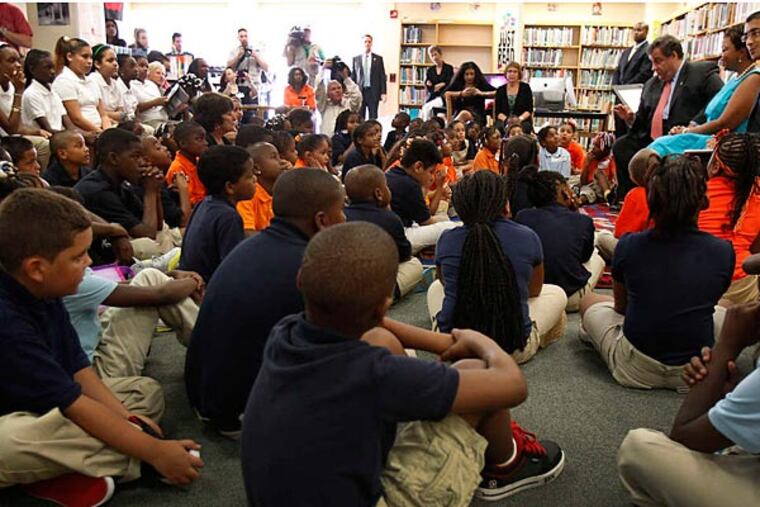Camden schools show mixed results on state tests
CAMDEN A school district ranked one of the worst in New Jersey showed flat or slightly improved student test scores last year.

CAMDEN A school district ranked one of the worst in New Jersey showed flat or slightly improved student test scores last year.
Camden schools, taken over by the state in June, improved in language arts from 19 to 21 percent of pupils scoring at or above the state-mandated proficiency level. Math scores stayed at 30 percent, according to data for the 2012-13 school year released last week.
There were signs of moderate progress in individual schools.
Statewide, six of the schools with the most improved test scores in specific grade-level subjects were in Camden, including Freedom Academy Charter School, which was slated to close because of its failing test scores two years ago.
Five of the six schools that showed the most improvement still failed, scoring below 50 percent proficiency in math, language arts, or both, according to results of the N.J. Assessment of Skills and Knowledge (ASK) test and the N.J. High School Proficiency Assessment.
At Camden's Pride Charter, third-grade math scores went from 67 percent to 92 percent proficiency. The school scored 55 percent in language proficiency in that grade.
Freedom Academy Charter upped its third-grade Language Arts scores from 45 percent to 68 percent and math scores from the low teens to 37 percent.
That signaled a turnaround for the school, which was put on state probation because of poor academic results and hired the New York City-based DemocracyPrep to manage the school beginning in fall 2012.
Bryan Wood, a sixth-grade teacher at Freedom Academy for four years, said the major difference under DemocracyPrep management has been better teacher training and higher expectations for student learning.
"Before, with teachers, it was a lot of 'You should be able to figure this out, you went to college,' and very little professional development. As far as the kids, there was an assumption they weren't capable of higher-level work."
Bridgit Cusato-Rosa, campus director of Freedom Academy, said teachers have five hours of professional development every Friday. With math scores below 40 percent, she acknowledged the school still has a lot of work to do. "That was only year one," she said.
R.C. Molina, Sharp, and Creative Arts Morgan Village also showed improvements from remarkably low scores in 2012 but are still far below 50 percent proficiency.
The results do not include data from schools where fewer than 10 students took the test, nor do they take into account retention or enrollment numbers of students with special needs, which can affect any comparative analysis.
On Thursday state-appointed superintendent Paymon Rouhanifard addressed concerns about the district with parents, teachers, and students at a town-hall meeting at Henry L. Bonsall Elementary School.
Rouhanifard is nearing the end of a 100-day listening tour to gather information, concerns, and advice before releasing a plan for the schools in mid- to late December.
In a two-hour question-and-answer session moderated by Mayor Dana Redd, Rouhanifard took questions from parents, community members and teachers as students ate cookies and collected free school supplies.
Cindy Janczewski teaches third grade at Whittier Elementary. She had been a teacher in the district for 27 years and said that in addition to being understaffed, the district had historically struggled to get resources into students' hands.
"It's easy to say they exist, but are they reaching every child?" Janczewski said before the meeting. "It's easy to say, 'There's a smartboard in every classroom,' but are they actually there, and are they working?"
Questions from the audience took in such subjects as bringing back a band to the Bonsall School, a student request for longer recess, safety, and a shortage of bilingual and special education teachers.
"Our long-term goal is to improve learning," Rouhanifard said toward the end of the town-hall meeting. "Every student should have access to a high-quality school."
The next town hall is scheduled for Wednesday at 6 p.m. at Woodrow Wilson High School.
>Inquirer.com
For an interactive graphic on South Jersey's test score results, visit www.inquirer.com/
njscoresEndText